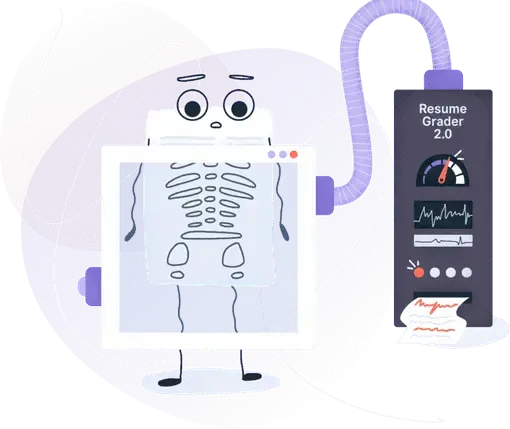Sustainability Skills: Example Usage on Resumes, Skill Set & Top Keywords in 2025
Including sustainability as a skill on your resume conveys to recruiters your commitment to environmental responsibility and showcases proactive problem-solving abilities. Dive into the guide below for inspiration to craft your resume with impactful synonyms and varied expressions of your capabilities.


Is your resume ATS-friendly?
Drop your resume here or upload a file to find out if the skills in your resume are readable by an ATS.
Sustainability skills refer to the ability to understand and act in ways that contribute to a healthier environment and society. This includes making decisions and taking actions that can support long-term ecological balance, such as conserving resources, reducing waste, and improving social equity. On your resume, highlighting sustainability skills can show employers your awareness of environmental concerns and your commitment to responsible behavior both in the workplace and in broader society. Demonstrating this skill implies that you have forward-thinking, can contribute to cost savings through efficiency, and may help the company improve its social and environmental impact.
However, there are a few potential drawbacks to adding sustainability as a skill on your resume. If the job you're applying for isn't directly related to environmental practices or corporate social responsibility, emphasizing this skill might not be relevant and could distract from your other qualifications. Moreover, without concrete examples of how you've applied sustainability in practical ways, it might come off as just a buzzword rather than a true competency. Instead of just mentioning "sustainability," it's more beneficial to describe specific sustainable projects you've led or participated in, or relevant certifications you've earned that can validate your claim.
In this article, you will learn:
- The positive and negative impacts of adding sustainability as a skill on your resume.
- Actions that might be more effective than simply listing "sustainability" on your resume.
- Alternative expressions for "sustainability skills" that can be used on your resume.
Misusage of Sustainability on Resumes
Having sustainability skills on your resume can help you stand out in a job market increasingly focused on environmental responsibility. However, it's important to present these abilities honestly and clearly, avoiding any suggestion of exaggeration or irrelevance, which can undermine your credibility. Misrepresenting your experience with sustainability can leave employers skeptical of all your listed qualifications.
- In the summary section: Stating "Expert in reducing carbon footprints for Fortune 500 companies," when your only experience is organizing a single recycling drive at your office.
- In the experience section: Listing "Led a company-wide sustainable initiative," when you only participated in a one-time, informal discussion about reducing office paper use.
- In the achievements section: Claiming "Achieved zero waste for the entire organization," when you simply implemented a basic recycling program that did not address other forms of waste.
How to Demonstrate Sustainability Skills on Your Resume
- Highlight relevant education and certifications by listing your degree in a field related to sustainability, along with any additional certificates or training that show your knowledge and dedication to sustainable practices.
- Describe work experience with specific examples that showcase your skills in implementing sustainable solutions, such as managing waste reduction programs, enhancing energy efficiency, or conducting sustainability audits for an organization.
- Detail involvement in sustainability projects, including voluntary and community initiatives where you have actively contributed to environmental conservation or sustainability awareness campaigns.
- Showcase your ability to use sustainability-related tools and technologies, such as proficiency in environmental management systems (EMS), life cycle assessment (LCA) software, or other tools used for monitoring and improving sustainability performance.
- Include soft skills that are vital for sustainability roles, like teamwork by demonstrating how you have successfully collaborated with others to achieve shared sustainability goals, or problem-solving by providing examples of how you have developed innovative solutions to environmental challenges.
Example 1: Demonstrate sustainability in the experience section
- •Directed a team to reduce company waste by 30%, by implementing comprehensive recycling and composting programs.
- •Collaborated on the Water-Saver project, resulting in a 25% reduction in water usage through employee education and new technology.
- •Managed an energy efficiency overhaul of company facilities, leading to a drop in energy consumption by 22%.
- •Led client sustainability audits, identifying opportunities to improve efficiency and supporting the implementation of green policies.
- •Developed a supplier code of conduct focused on environmental stewardship, influencing over 50 suppliers to adopt sustainable practices.
- •Organized three annual corporate events focused on sustainability education, attended by over 300 industry professionals each.
- •Analyzed and reported on the impact of solar panel installations, leading to an increase in energy production by 40% for our clients.
- •Conducted research on local solar incentives, contributing to a 15% growth in customer adoption in the first year.
- •Played a key role in a cross-functional team that developed a new solar panel tracking system, improving tracking efficiency by 18%.
- This resume example shows clear, quantitative accomplishments, which tell potential employers the exact impact that the applicant had at their previous jobs.
- Each item is a clear demonstration of the applicant's commitment to sustainability without overusing common phrases or jargon.
- The bullet points describe varied roles and responsibilities, providing a well-rounded picture of the applicant's skills and experiences.
- The use of active verbs and concrete numbers in describing successes makes the experience more credible and eye-catching to anyone reading the resume.
- The examples showcase the ability to lead successful projects and initiatives that align with business goals and environmental benefits.
Example 2: Demonstrate sustainability in the summary section
- Highlighting 10 years' experience shows depth of knowledge and expertise.
- Describing measurable achievements (e.g., reducing emissions by 30%, leading solar panel installation) gives credibility.
- Specifying technical skills (e.g., renewable energy systems, LEED certification) shows the candidate’s relevant capabilities.
- Focus on sustainability efforts aligns with job and company goals in environmental management.
- The absence of overused buzzwords makes the summary more authentic and direct.
Example 3: Demonstrate sustainability in the achievements section
- The achievements clearly show the skill of sustainability, providing tangible numbers and outcomes.
- Concrete figures like "30%" and "25%" offer a clear measure of the applicant’s impact on sustainability practices.
- The use of simple and direct language makes it clear that the candidate had a leadership role in the initiatives mentioned.
- There's a visible connection between the candidate's actions and the positive environmental results achieved.
- Descriptions are concise, avoiding unnecessary words and focusing on the results and benefits.
- Each achievement is relevant to the sustainability skill, demonstrating the candidate's commitment in different areas from energy to waste management.
What Are the Relevant Certifications for Sustainability Skills on Resume
If you're aiming to demonstrate your commitment to sustainable practices, these certifications could serve as valuable evidence on your resume:
The top 5 certifications for gaining sustainability skills expertise:
This certificate focuses on green building design, construction, and operations. Acquiring this credential shows your understanding of current sustainable building standards and practices, and can help you gain a competitive edge in the construction and design industry.
The CSP designation is aimed at individuals who work in various sectors managing sustainability initiatives. It validates your experience and expertise in managing and directing sustainability projects and can bolster your credentials in sustainability management roles.
As an Envision Sustainability Professional, you'll have proven knowledge in applying sustainable infrastructure rating systems. This can facilitate your participation in constructing projects that adhere to sustainable and resilient infrastructure practices.
The SMCP certificate prepares you to oversee sustainability programs within organizations. It provides skills in developing and managing corporate sustainability strategies, which can be pivotal for roles related to sustainability consulting and corporate social responsibility.
This certificate emphasizes the integration of financially material sustainability information into company reports. Earning this distinction demonstrates your proficiency in identifying and communicating the financial impacts of sustainability, appealing to positions centered around finance and sustainability reporting.
Top skills people add together with sustainability skill on resume:
Environmental Science
Project Management
Life Cycle Assessment
Renewable Energy Systems
Environmental Impact Assessment
Corporate Social Responsibility
Environmental Policy
Green Building
Waste Management
Data Analysis
Critical Thinking
Problem Solving
Communication
Leadership
Adaptability
Teamwork
Innovation
Attention to Detail
Organizational
Time Management
Strategic Planning
Most Relevant Jobs for Sustainability Skills
Sustainability skills are increasingly becoming critical across various sectors as organizations strive to reduce their environmental impact and embrace greener practices. Professionals with knowledge in sustainability can find opportunities in many fields, which prioritize eco-friendly initiatives and require strategic planning to balance development with environmental conservation. These roles often involve assessing and implementing sustainable practices, managing resources efficiently, and promoting corporate social responsibility. Here’s a list of positions where such competences are highly sought after:
- Sustainability consultant
- Environmental manager
- Corporate social responsibility (CSR) manager
- Renewable energy analyst
- Green building architect
- Sustainable supply chain specialist
- Director of sustainability programs
- Environmental educator
- Sustainability communications coordinator
- Waste reduction manager
Key Takeaways
- Sustainability skills on your resume show a commitment to responsible practices and can increase your job prospects.
- Avoid overstating these skills and relate them concretely to past experiences to maintain credibility.
- Highlight sustainability skills on your resume through examples of previous work, certifications, and relevant projects.
Make one that's truly you.




